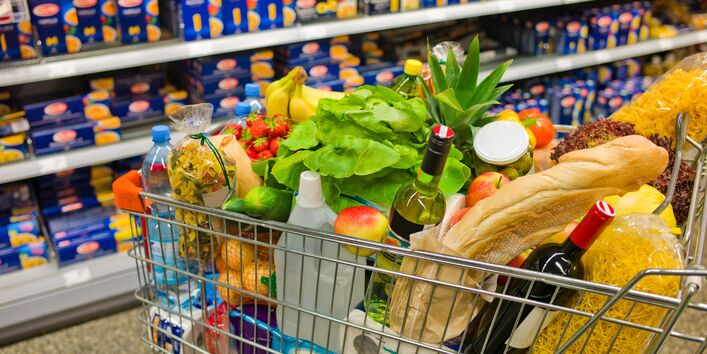Sustainability in supermarkets: Retail can do more
Sustainability in supermarkets has many facets. It ranges from resource-conserving food production and environmentally friendly packaging to the avoidance of food waste. The German food retail sector is already involved in this area. However, companies could use their influence and scope for action even more to steer the food system towards sustainability. This is shown by a recent study conducted by the Research Institute of Organic Agriculture (FiBL) on behalf of the German Environment Agency (UBA), which analysed the sustainability activities of food retailers for the second time.
UBA President Dirk Messner: “For more sustainability in the food system, it makes sense and is logical to start with the key player in the value chain – the food retail sector. Retail has a major influence on agriculture and the purchasing behaviour of the population. There is a relatively high probability that one company's approach will be imitated by others due to growing public pressure and the competitive situation.”
As early as 2022, an evaluation system was developed on behalf of the UBA to systematically record, evaluate and categorise the activities of the eight companies with the highest turnover in Germany (ALDI Nord, ALDI Süd, EDEKA, Kaufland, Lidl, Netto Markendiscount, PENNY and REWE) in environmental and climate protection.
The current study now finds that both the political measures taken since then, such as the Supply Chain Sustainability Act (LkSG) and the “Pact against Food Waste”, as well as the voluntary commitment of companies, are having a clear impact. For example, individual companies have announced their intention to completely dispense with food imported by air in future. Although air freight only makes up a small proportion of the product range, it emits 170 times more greenhouse gases than transport by ship.
Animal welfare and social criteria also analysed
For the current study, the assessment tool was expanded to include social aspects (labour and human rights in the supply chain) and animal welfare. The results of the study show that the performance of the companies in the environmental area is better than in the two new areas.
Compared to the results of the last report in 2022, many companies have improved in most areas of action, particularly in sustainability management. They have systematically analysed deficits, set themselves more measurable and ambitious targets and also monitored target achievement better. In contrast, the greatest deficits were identified in the areas of action that relate directly to the procurement of raw materials and products.
“It is right and important that food retailers not only focus on their own greenhouse gas emissions, but also on those of the entire value chain,” says UBA President Messner. “However, the increased environmental and climate requirements must also be accompanied by appropriate financial compensation from the retail sector in order to enable producers to operate profitably. Simply ‘passing on’ the requirements will only lead to even greater resentment among farmers.”
Details of the study
The study was conducted on behalf of the German Environment Agency (UBA) by the Research Institute of Organic Agriculture (FiBL) Switzerland and Germany, with support from the University of Giessen and the Technical University of Nuremberg. The FiBL had already developed a scientifically based assessment tool for the UBA in 2022 to record and evaluate the environmental performance of food retail companies. This tool was expanded in the current study to include the sustainability dimensions of social responsibility and animal welfare. Based on a total of 23 fields of action, 90 indicators and 103 sub-indicators, the data of the food retail sector was collected and evaluated from publicly available sources as well as for internal company information using an individualised questionnaire. The current study highlights the current status of food retail monitoring for the year 2023. On the one hand, it shows the trends and developments in the transformation of the food system that are being initiated by the food retail sector, while on the other hand, it also identifies the need for further action by other stakeholder groups in order to provide additional social impetus for greater sustainability in the food retail sector.
